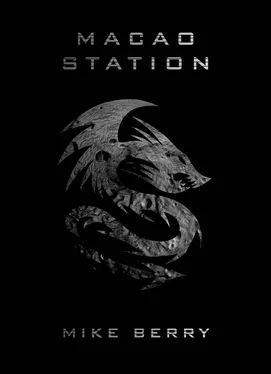Майк Берри - Macao Station
Здесь есть возможность читать онлайн «Майк Берри - Macao Station» весь текст электронной книги совершенно бесплатно (целиком полную версию без сокращений). В некоторых случаях можно слушать аудио, скачать через торрент в формате fb2 и присутствует краткое содержание. Год выпуска: 2012, Жанр: Космическая фантастика, на английском языке. Описание произведения, (предисловие) а так же отзывы посетителей доступны на портале библиотеки ЛибКат.
- Название:Macao Station
- Автор:
- Жанр:
- Год:2012
- ISBN:нет данных
- Рейтинг книги:3 / 5. Голосов: 1
-
Избранное:Добавить в избранное
- Отзывы:
-
Ваша оценка:
- 60
- 1
- 2
- 3
- 4
- 5
Macao Station: краткое содержание, описание и аннотация
Предлагаем к чтению аннотацию, описание, краткое содержание или предисловие (зависит от того, что написал сам автор книги «Macao Station»). Если вы не нашли необходимую информацию о книге — напишите в комментариях, мы постараемся отыскать её.
Macao Station — читать онлайн бесплатно полную книгу (весь текст) целиком
Ниже представлен текст книги, разбитый по страницам. Система сохранения места последней прочитанной страницы, позволяет с удобством читать онлайн бесплатно книгу «Macao Station», без необходимости каждый раз заново искать на чём Вы остановились. Поставьте закладку, и сможете в любой момент перейти на страницу, на которой закончили чтение.
Интервал:
Закладка:
Soros: an unremarkable star, with a mass about one-point-three times that of Sol; older by a billion years or so, but still expected to last long enough that humanity would go the way of the Predecessors long before its fires could burn out. It marked one of the furthest extremities of the great expansion into space.
The Soros system was also a mostly unremarkable one, except that nobody had ever bothered to terraform any of its planets. Farsight Exploration, one of the original deep-space corps, owned the only habitable outpost there, which is to say that they effectively owned the system itself, for what it was worth.
Far from exploration, Farsight had long-since turned its hand to mineral extraction. Many believed that they maintained the station there, with all the expensive supply-chain issues this implied, merely as a launchpad for a second great rush for resources, should one ever occur. The mineral wealth sent back to the more occupied regions of Farsight space just about paid for the outpost’s existence.
Macao Station: a standard Farsight mining base, made from prefab pieces shipped from the neighbouring Platini system in the great echoing bellies of the original pioneer-ships, then bolted together more as cost than liveability dictated. An island at the extremity of human space. A singular, distant monument to the fallen drive for expansion. A sentinel at the trailing edge of infinity.
Alone. . .
Chapter One
Darkness, cold, an echoing icy tomb without air. The man moved slowly, suited and clumsy, floating down the tunnel. He didn’t know why he was there. But he had been drawn. . . compelled. It made no sense.
Onwards into an impenetrable world of shadow. His suit-light flowed over shiny rock, a hostile microcosm of frozen stone. The suit respired clouds of rolling vapour that streamed around him like ghosts. He dragged himself across the rock, drawn onwards into that midnight abscess. His mind was calm and empty. He knew no fear.
He emerged into a larger space where his light didn’t even touch the far wall. The darkness was so deep as to be almost deliberate — a velvety, living medium in which anything might grow. His own breathing filled the universe.
He floated there, suspended, a drifting angel alone in the whole of creation. Immense mass hung poised around him, waiting to crash down, a held breath of darkness. He looked around, seeing nothing. He floated in a tank of purest void — weightless, singular, at peace in isolation.
He was alone. Yet something else was in there with him.
He felt a living wave that oozed from the frozen matter around him, a radiation, a thing that lived inside the folds, woven into the fabric of space itself. It was there. He could feel it. His skin was tingling. His heart began to race. He knew now why he had come. He cast his light around, but the space in which he floated was like a sensory deprivation chamber. There was nothing.
But within that nothing, within that blackness, there was something . . . A pattern. . .
And then it spoke to him.
‘My emissary. You have come to me. . . Listen. . .’
Chapter Two
Macao Station hung above the rotational plane of the Soros system like an overlooking god. Below, if such a direction could be said to have meaning in space, the asteroid belt sprawled vastly across an expanse of some four hundred million miles — an apparently endless sea of glittering shards. From their scarred surfaces, pockets of concentrated metallic ores caught the light of Soros and flung it back, tinted with the shades of iron, copper, nickel, even gold. These colourful lights winked on and off as the rocks rotated gently in their timeless ballet, the station keeping perfect step. Icebergs moved amongst the swarm like pale shades.
Occasionally, a rogue element would come crashing through this ordered procession — usually an incoming meteor from Platini-direction — and smash into one of the belt objects, either causing obliteration in a cloud of dust or setting off a chain of collisions. These legacies of disorder could continue for long, long periods, complicating navigation through the belt, but eventually the mostly-uniform motion of the great mass would correct any errant rocks, and the timeless discipline would be restored.
Lina McLough looked out over this vista from the window of the canteen, whose floor was on the middle level of the rotating wheel of Macao Station. She was swirling the unimpressively lumpy dregs of her coffee in its plastic mug.
Most of the denizens of the station found the real-view mode of the windows somewhat nauseating. After all, the whole thirteen-hundred-metre wheel of Macao spun one full revolution every fifty-one seconds, causing the field of asteroids to whirl past at a somewhat dizzying rate. The windows were usually set to display the feed from cameras mounted on tracks that encircled the station, whose steady movement in a counter-spin direction offset the rotation and created a merciful, much less sickening, impression of relative stillness. But Lina preferred the real-view.
The canteen was quiet at this time: a few other miners using up their last minutes of freedom before joining Lina’s shift on duty; a small group of admin staff; two off-duty members of the security team; and Lina, waiting for Eli to return from the toilet.
Si Davis, Niya Onh and Petra Kalistov, the other miners, were laughing and shoving each other over some mutually-insulting exchange of words, obviously completely at ease together. After all, most of the inhabitants of Macao had been here for many years. They were an odd and disparate bunch. Some of them had fled from Platini system due to personal or professional tragedy. Others had actively sought the quiet of the frontier life. Many had been drawn here by the salary, which easily outstripped what they might receive for similar work at Platini. Some of them had even been born on-board. These three, like Lina herself, were immigrants, but they’d all been here as long as she could remember. She knew these people like family. It was a strange family, admittedly, but one that was bound by undeniably strong ties despite its numerous sub-sects and inner cliques. After all, they daily depended on each other’s diligence to stay alive.
She absently cycled through the view-modes of the window, tapping it to change them. Three of the seven didn’t work at all, and one showed only an inward-looking close-up of the station’s own hull. She settled again on the real-view of the belt — a seemingly endless swathe of mineral wealth, an infinite job of work.
It was said that Macao could justify its expensive existence for many billions of years based on the volume of metals out there. She would have thought that the company would pay a little more attention to upkeep, bearing that in mind. It was believed, though, that Macao was kept alive mostly as an outpost, a launchpad, against the contingency that a second great interstellar land-grab should one day ensue. Its outlying position would give Farsight a natural advantage over most of its competitors in the unlikely event that this should happen.
Macao, as the expression went aboard, was just spinning itself — just about paying to keep itself turning. The investment required to increase production, and supply this produce first to Platini, and from there further into more densely-occupied space, would be so great as to be simply uneconomical. And for all their faults, Farsight could never be accused of poor economy.
So Macao just spun itself, ad infinitum, its failing systems replaced or repaired only as necessity dictated, sometimes not even then. The K6s, the in-system mining ships that supplied Macao with its lifeblood of raw materials, only ever flew due to the ingenuity of the maintenance team and ground crew, aided by Eli, a truly inventive scavenger and maker-do. It was not uncommon for a K6 to take off in a condition that would be considered un-flightworthy elsewhere.
Читать дальшеИнтервал:
Закладка:
Похожие книги на «Macao Station»
Представляем Вашему вниманию похожие книги на «Macao Station» списком для выбора. Мы отобрали схожую по названию и смыслу литературу в надежде предоставить читателям больше вариантов отыскать новые, интересные, ещё непрочитанные произведения.
Обсуждение, отзывы о книге «Macao Station» и просто собственные мнения читателей. Оставьте ваши комментарии, напишите, что Вы думаете о произведении, его смысле или главных героях. Укажите что конкретно понравилось, а что нет, и почему Вы так считаете.









![Джулия Берри - Нежная война [litres]](/books/405408/dzhuliya-berri-nezhnaya-vojna-litres-thumb.webp)


